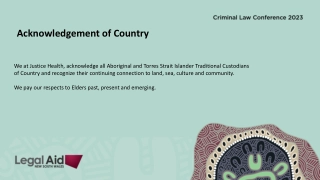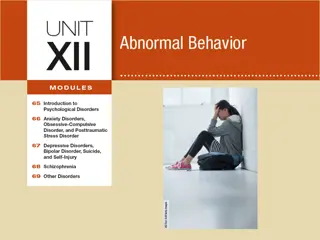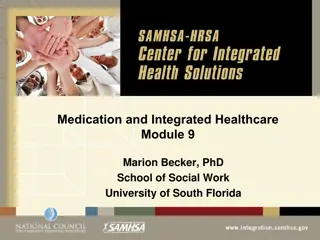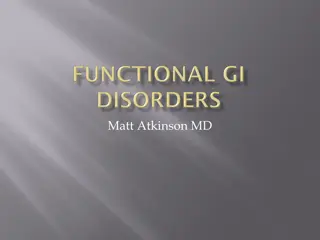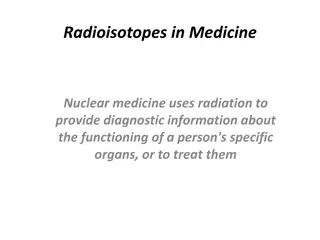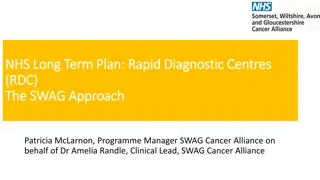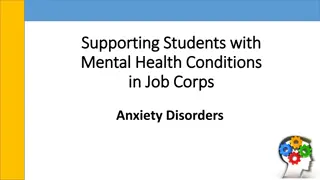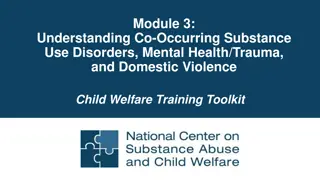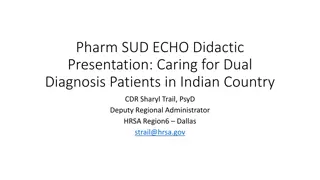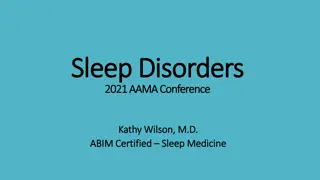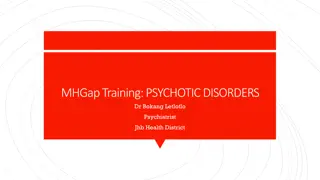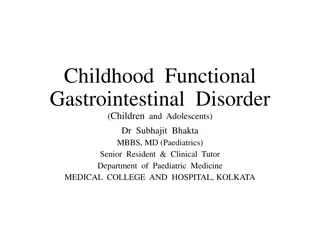Understanding Mental Disorders and Diagnostic Controversies
A deep dive into mental disorders, their definitions, and diagnostic challenges. Explore the subjective nature of diagnosis, the impact of DSM, and the debate around the medical model in mental health.
Download Presentation

Please find below an Image/Link to download the presentation.
The content on the website is provided AS IS for your information and personal use only. It may not be sold, licensed, or shared on other websites without obtaining consent from the author.If you encounter any issues during the download, it is possible that the publisher has removed the file from their server.
You are allowed to download the files provided on this website for personal or commercial use, subject to the condition that they are used lawfully. All files are the property of their respective owners.
The content on the website is provided AS IS for your information and personal use only. It may not be sold, licensed, or shared on other websites without obtaining consent from the author.
E N D
Presentation Transcript
Psychology 1200 Lecture 4 Mental Disorders
Definitions I was taught and I taught students for many years until recently A mental disorder is atypical, disturbing, unjustified and maladaptive. Your book says . A persistent disturbance or dysfunction in behavior, thoughts, or emotions that causes significant distress or impairment. Nolen-Hoeksema says Subjective judgement about whether a person's symptoms meet behavioral or emotional criteria. Criteria have to do with abnormality, and/or whether the individual or others around them are distressed, dysfunctional or deviant.
Definitional Issues Subjective Non-biological or physiological. Not precise Different over time and between people A function of culture, gender and/or social context Abnormality??? So what s the issue? The definition of mental disorder is NOT operational!
Operationism Reminder What something is, is given by the technical definition of it (method 3). We make up technical definitions. They have 4 features: 1. Clear 2. Unique 3. Public & shared 4. Fairly stable over time For example we are not interested in water, that is not technically defined. We make up H2O and define it technically. We are not interested in intelligence, that is not technically defined. We make up IQ or g and define it technically.
The Problem Diagnosis was not really diagnosis; it was merely a form of labelling . Diagnosis was highly subjective. Psychiatrists could be easily duped. Psychotropic drugs could be legally prescribed when patients were not ill or suffering from a real disorder or disease.
The Response DSM .Operationism Gives the perception of objectivity Gives the impression that diagnosis is medical. Instantiates the medical model as the basis for diagnosis and treatment of MENTAL ILLNESSES. Provides health insurers with a seemingly objective basis for compensation. Establishes psychiatry as a fully justified medical specialty.
The Medical Model Cause Condition Symptoms Treatment Drugs/surgery Biological Biological Psychological Disease/Illness Psychological Therapy Lifestyle modification Social Social Cause High BP Condition Symptoms Treatment Drugs Chest pain Anxiety Heart disease Fear Counselling Change job Stress at work Withdrawal
The Medical Model: Depression Cause Condition Symptoms Treatment Drugs/surgery Biological Biological Psychological Disease/Illness Psychological Therapy Lifestyle modification Social Social Cause Condition Symptoms Treatment Insomnia Drugs Neurotransmitters Feelings of worthlessness Depression Guilt Counselling Loss of job Withdrawal Change job
You! All of this is why YOU THINK Mental disorders are illnesses related to abnormal brain function and that they can be treated with medication. Now let's look at the problem with this
The Medical Model: The Problem Cause High BP Condition Symptoms Treatment Drugs Chest pain Anxiety Heart disease Fear Counselling Change job Stress at work Withdrawal Cause neurotrans Condition Symptoms Treatment Drugs Insomnia Feelings of worthlessness Depression Guilt Counselling Change job Loss of job Withdrawal
A Cautionary Example: RSS Present-day symptomology found in Aboriginal Peoples and societies does not constitute a distinct psychological condition, but is the well known and long- studied response of human beings living under conditions of severe and prolonged oppression. Although there is no doubt that individuals who attended Residential Schools suffered, and continue to suffer, from the effects of their experiences, the tactic of pathologizing these individuals, studying their condition, and offering "therapy" to them and their communities must be seen as another rhetorical maneuver designed to obscure (to the world at large, to Aboriginal Peoples, and to Canadians themselves) the moral and financial accountability of Euro- Canadian society in a continuing record of Crimes Against Humanity.
A Huge Advance Or? So, is the medical model and advancement or is it just different? DISCUSSION QUESTION 4 What is the right way for psychologists to conceptualize mental disorders? Should we use medical language like illness, diagnosis and treatment? Does all this medical language help or does it hinder us to properly understand and deal with mental disorder? Find sources from the internet that argue for and against the medical model. What are they saying? Does it make sense? Take the arguments from lecture into consideration in your response.


